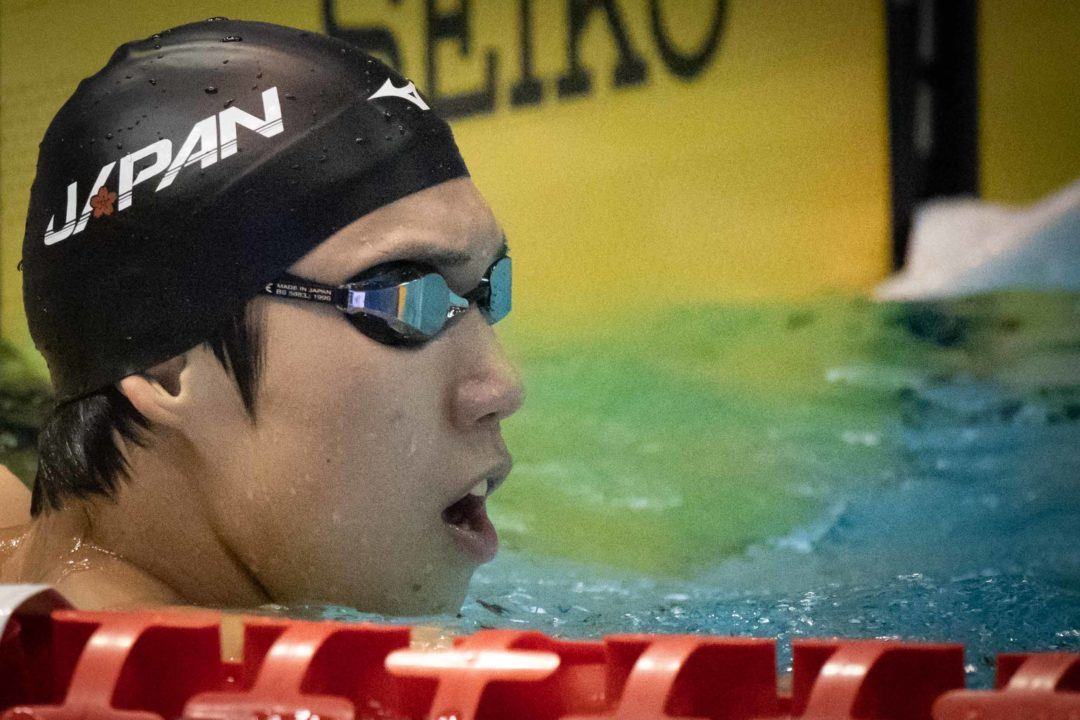At the 2019 FINA World Aquatic Championships, the nation of Japan snagged a glimpse of what could transpire at a home nation-hosted Olympic Games.
In addition to Daiya Seto‘s incredible 200m IM/400m IM double gold, Katsuhiro Matsumoto soared to a new lifetime best and Japanese national record time of 1:45.22 to come away with the men’s 200m free silver medal. That silver in Gwangju made Matsumoto Japan’s first-ever World Championships medalist in this event.
23-year-old Matsumoto kept the momentum going, adding the Japanese short course 200m freestyle national record to his resume. In October 2019, the Central Sports Yatsu star punched a time of 1:42.41 to overtake the national standard and further establish himself as Japan’s premier 200m freestyler heading into a then-scheduled 2020 Olympic Games.
And Matsumoto wasn’t even done. In January he put up another sub-1:46 200m free, hitting 1:45.82 at the Kosuke Kitajima Cup. While competing at the Tokyo New Year Meet also in January, Matsumoto fired off a time of 3:37.94 in the SCM 400m free to not only snag gold but also establish a new Japanese national record in the process, making it his 3rd in just 7 months.
More recently, post-coronavirus-pandemic-lockdown, the Yoji Suzuki-trained star put up a 200m free time trial of 1:45.44 this past May. He had been fueling his fortitude with high-altitude training in Mexico from February to March before pumping out a time that would have beaten co-bronze medalists Duncan Scott of Great Britain and Martin Malyutin of Russia at last year’s World Championships.
This week SwimSwam spoke with Matsumoto, whose friends call him Katsuo, asking what makes him such a threat in the water, as well as what he does to stoke his fire outside the pool.
Targeting the Olympic Games, rescheduled to begin July 2021, Matsumoto told me, “The FINA [Worlds] experience gave me confidence and assured me I could earn a medal if I worked very hard. It also made me want a gold medal.
“I was sad and disappointed about the Olympic postponement. I do not know how the swimmers in other countries are currently training. I feel we should make the Olympics that all of us in the world agree on- I would like to compete under fair circumstances for all.”
As we reported, due to coronavirus measures at the Central Sports facility, Suzuki says his squad is now only training once per day, as opposed to their usual twice-a-day routine, swimming about 4,000 meters at a time. Also, to reduce the risk of coronavirus, the squad is practicing in 3 separate groups, with 5 to 8 people at a time.
Nevertheless, Matsumoto is able to pump out quality training sets, such as the following:
The freestyle ace says he’ll be focusing on the 100m and 200m freestyle individual events for next year’s Japan Swim, the meet which represents the nation’s sole Olympic Games-qualifying opportunity.
Matsumoto, who says he pulls inspiration from the aforementioned Scott, as well as Lithuanian Danas Rapsys, is not only a mega-weapon individually, but his relay contributions are also critical help Japan improve over its placements from Rio.
At the 2018 Pan Pacific Championships in Tokyo, Matsumoto clocked the quickest 100m free split of his nation’s bronze medal-winning 4x100m freestyle relay. As the 3rd leg, Matsumoto busted out a split of 47.61 to help the nation onto the podium, as well as register a new national record and Asian continental relay record of 3:12.54.
A year later at the 2019 FINA World Aquatic Championships in Gwangju, Korea, Matsumoto once again rocked a sub-48 split, touching in 47.95 to help the nation place 9th in Gwangju and qualify for next year’s Olympic Games.
Regardless of what he’s swimming, Matsumoto says his strategy is to focus on his own pace, blocking out how the others are swimming in the other lanes. His goal is to hit his last 50m the hardest.
Overall, Matsumoto says the Japanese national team’s training mood is fair and they all try to capitalize on the fact they live relatively close together and they ‘try to have fun together’ as much as they can amidst the pandemic.
Looking even beyond the Games, when asked what his plans are to possibly participate in the International Swimming League, especially in light of a new Japanese team for season 2, Matsumoto responded, “It’s a secret.”
In the meantime, he’s charged with another year of pushing himself to new heights with potential Olympic glory on the line, living and grinding by his motto of, “You are what make your efforts pay off.”
SwimSwam thanks Rebecca Nishikawa- Roy for her generous translation assistance.

question. Did he do 18 X 50 on 1:30?
Was going to ask the same
I thought we can finally get a little information about the Japanese ISL team when I read the title, but… I wonder when they would like to make a public announcement. Have swimmers been required to keep things secret?
And one interesting fact: His nickname Katsuo means bonito in Japanese.